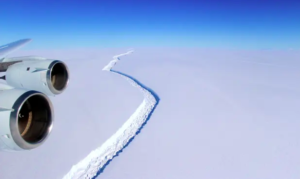Royal Society award gives international exposure to work in polar sciences, computational mechanics
The School of Engineering’s work in polar and climate science, plus computational mechanics, will get international exposure with a two-year travel grant from the Royal Society, the independent academic society of the U.K., for a collaboration between a Vanderbilt professor and a professor in England.
The project will establish new approaches for simulating fracture propagation in Antarctic glaciers and ice shelves and exploring ice-ocean-atmospheric interactions which, eventually, will help reduce uncertainty in predictions of expected sea level rise and inform climate adaptation policies.
Ravindra Duddu, associate professor of civil and environmental engineering, will travel to the U.K. in Summer of 2022 to conduct research with William Coombs, associate professor engineering at Durham University. Duddu is also scheduled to visit and deliver seminar talks at several major universities, including Imperial College in London, Durham University, the University of St. Andrews in Scotland, and, time permitting, the University of Cambridge and the University of Oxford. In Spring 2023, Durham University faculty William Coombs and Stefano Giani will visit Vanderbilt University.

The project is titled “Efficient computational methods for mixed-mode fracture propagation in glaciers and ice shelves.”
“Simulating fracture propagation at the scale of ice shelves, which are hundreds of kilometers long and hundreds of meters thick, poses serious computational challenges,” Duddu said. Our collaborative project explores the potential of advanced numerical techniques to enable the modeling of ice shelf fracture at extreme size scales.”
Team members have complementary sub-specialties. Duddu investigates the conditions enabling fracture propagation in glaciers and ice shelves, advances physics-based modeling, and translates new computational methods to glaciology.
Coombs focuses on the development of numerical methods to tackle complex problems in engineering and solid mechanics, specifically large deformation and non-linear material behavior that cannot be solved using commercially available software.
Giani, an applied mathematician, focuses on the development of adaptive higher order finite element methods and numerical analysis to quantify errors.

Antarctic ice shelf fracture has huge implications in terms of sea level rise. It is estimated that the fracture process is responsible for half the mass lost from floating ice shelves and marine-terminating glaciers in Greenland and Antarctica. Understanding ice fracture is of critical importance because there is major concern that rapid changes in the marginal ice zones could destabilize the Antarctic and Greenland ice sheets.
The Royal Society’s International Exchanges initiative allows UK scientists to stimulate new collaborations with leading scientists overseas through bilateral travel. Coombs and Duddu were introduced, via email, in 2019 by John Brigham, BE’03, an associate professor of civil and environmental engineering at the University of Pittsburgh.
The team aims to leverage this travel grant to seek future funding through programs jointly run by the Natural Environment Research Council in the U.K. and the U.S. National Science Foundation.
